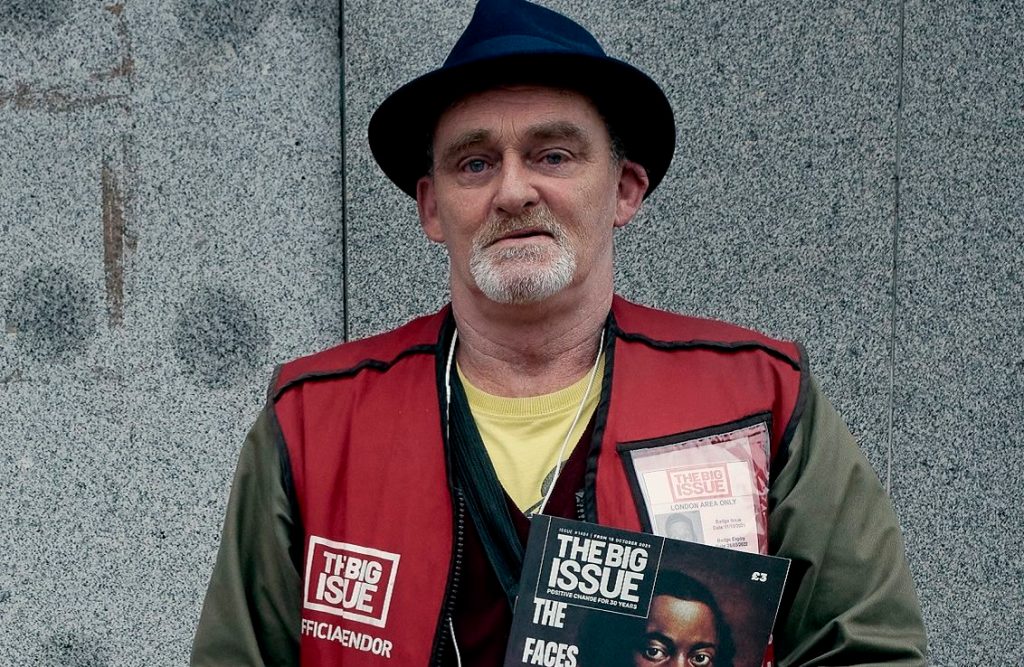Paul Logan, 62, Oxford Circus, Central London
Big Issue vendor Paul Logan believes The Big Issue has been a 'saving grace' for him. Now he wants to help other vendors too
Support Paul
50% of net proceeds from your purchase of a gift subscription will go direct to Paul
Selling the magazine after lockdown is like a new venture. We’re in a brave new world now. You have to adapt and change or you go the way of the dinosaurs. I moved pitches to Oxford Circus because my old pitch at Liverpool Street completely died and I really couldn’t sustain it for five days a week. People are either working from home or found other jobs and I’m just not seeing the faces anymore.
I’m also covering the distribution point at Oxford Circus so I’m wearing two hats, you could say. I’ve been doing that on and off for over 10 years, back to when I started selling the magazine. To me, the role means giving back. It’s not just handing magazines out to vendors. It’s running them up the line to outreach for whatever services they may require. It’s helping out any way I can to get them sorted with card readers or tabards, or whatever.
My story of how I became home-less is one of a million stories of, like, a million different reasons why people become homeless. It’s not unique in that aspect but it’s an experience that I wouldn’t wish anybody to go through. I prefer not to look at how I became homeless, I prefer to look at what I have done in rebuilding my life since then.
The Big Issue to me was a saving grace. I don’t know where I’d be without it – possibly dead. When you’re on the street you’re at your lowest point and you don’t know where your future is going to take you. I personally could never envisage sitting on a street corner with my hand out and my kids walking by, or my parents walking by. I just didn’t have that in me. The Big Issue is a great alternative because it gives you back your dignity. It’s a very powerful machine because, as a customer, you get bang for your buck – when you invest in a magazine, you invest in the person and their future. It’s not just a transaction.
You form friendships – one of my regular customers, every year I go to his place for Christmas dinner. Many of my customers supported me during lockdown when I was off my pitch. They got me over that hurdle and I don’t know what I would have done without them. You can’t put a value on that. I fell into The Big Issue and I enjoyed doing it. It was a form of therapy, I guess, because when you are on the street for a while you withdraw from people. Selling The Big Issue, you have to put yourself out there and make contact with people. It’s some-thing that helped me greatly so I don’t mind giving back in any way I can. If I can help other people who are in the same situation I was, I know it’s a good thing to do.
Away from The Big Issue, I like listening to the music of the rock’n’roll era of the 70s – I saw Led Zeppelin play in New York City in 1977. That was an eye opener. No warm-up act, no backing band, no intermission and a three-and-a-half-hour concert. I use that as the standard I measure every-body else by when I go to see a show, and not too many come close to it.
The Big Issue is literally saving lives and changing lives. For somebody who buys the magazine on a regular basis, you can see the change in the person in front of you. And you can see the results of your efforts by supporting that person – that’s what makes it unique. Without the customers, we wouldn’t exist – so hats off to them.
Interview: Liam Geraghty
Oxford Circus, Regent Street, London, UK
